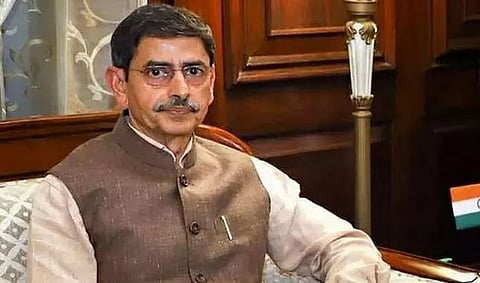
- Home
- Live Blog
- Breaking News
- Top Headlines
- Cities
- NE News
- Sentinel Media
- Sports
- Education
- Jobs

Transfer of Nagaland Governor and the Centre's interlocutor for Naga peace talks RN Ravi to Tamil Nadu has triggered speculations that stalemate in the peace process could be the reason behind the abrupt shifting of Ravi away from Nagaland affairs. Stalemate in peace talks between the Central Government and the National Socialist Council of Nagalim (Isak-Muivah) cannot be expected to end until a new interlocutor is appointed. The NSCN(IM) as well as several Naga civil society groups sought his removal as interlocutor than as the Governor after the peace talks reached a dead end. Ravi continues to be the interlocutor for Naga peace talks as the Central government has not yet indicated appointing a new interlocutor. As far as interlocutor Ravi is concerned, Naga peace talks had already ended in October 2019 and only the peace accord remains to be signed. The NSCN(IM) has been insisting that the accord cannot be signed without addressing the two key issues raised by them- a separate flag and a separate constitution for the Nagas. Ravi demonstrated his negotiation skill after being appointed the interlocutor in 2014 which led to the signing of the Framework Agreement with the NSCN(IM) in 2015. He also succeeded in bringing other Naga rebel groups on board through the signing of the "Agreed Position" with the Naga National Political Groups- a conglomerate of seven rebel groups in 2017 and pushed for a single peace accord with all Naga rebel groups. Lately, the Central government signing a ceasefire agreement with the Niki Sumi-led faction of the NSCN(K) triggering hopes of the inclusion of all Naga rebel groups as being a signatory to a common peace accord, but the development antagonised the NSCN(IM). The NSCN(IM)'s sharp reaction and caution that ceasefire agreements with "surrogate factions" would complicate the Naga issue only speaks volumes about the complexities in the Naga peace process. As a strong defender of the Indian Constitution, Ravi stood firm in his role as the Centre's interlocutor and ruled out a separate flag and separate constitution for the Nagas as dilution of this position will be tantamount to expanding the scope of negotiation beyond the limits set by the Constitution. Conceding to the demands of the NSCN(IM) of a separate flag and separate constitution for Nagas will give legitimacy to secessionist movements, armed as well as unarmed, which will be violative of the Indian Constitution. Even if a new interlocutor for Naga peace talks is appointed to replace Ravi, dilution of this position cannot be expected, nor it is advisable as it will open Pandora's Box and embolden other secessionist groups to balkanize India in collaboration with anti-India forces. Taking a firm position to defend the Indian Constitution cannot lead to an arbitrary declaration about the talk process being over. Even if the final agreement or solution is delayed by contentious issues, remaining seated around the peace table is critical to sustaining the peace process. More than the separate flag and the constitution for Nagas, the difference between the NSCN(IM) and the Central government over the powers and functions of the proposed Pan Naga HoHo for Nagas in Naga-inhabited areas of Manipur, Arunachal Pradesh, Assam besides Nagaland is believed to be holding up the final peace agreement. The Central government is understood to have agreed to the constitution of Pan Naga Hoho as a statutory body through an act of parliament with an advisory role for meeting the cultural aspirations of Nagas but with no political role or executive authority. The NSCN(IM), on the other hand, is learnt to have been insisting on Pan Naga Hoho having executive authority with powers to make laws applicable in Naga-inhabited areas. This has triggered apprehensions of an inter-state authority like Pan Naga Hoho coming into conflict with Article 371 A which provides special status to Nagaland and says that no Act of Parliament in respect of—religious or social practices of the Nagas, Naga customary law and procedures, ownership of transfer administration of civil and criminal justice involving decisions according to Naga customary law ownership and transfer of land and its resources, shall apply to the State of Nagaland unless the Legislative Assembly of Nagaland by a resolution so decides. While the Central government seems to have realized that solution to the vexed Naga political problem must include Nagas beyond the territorial boundaries of Nagaland, but it is aware of ground realities that any arrangement with implications on existing territories and powers of neighbouring states will be met with strong opposition. Running away from the problem is also running away from the solution. The appointment of a new interlocutor may help break the ice, but complexities of ground realities cannot be wished away. Indian Constitution has adequate space for articulating new models of power-sharing and governance. It requires imagination to articulate the one to address the political aspirations of the Nagas. Talks must resume ending the deadlock.